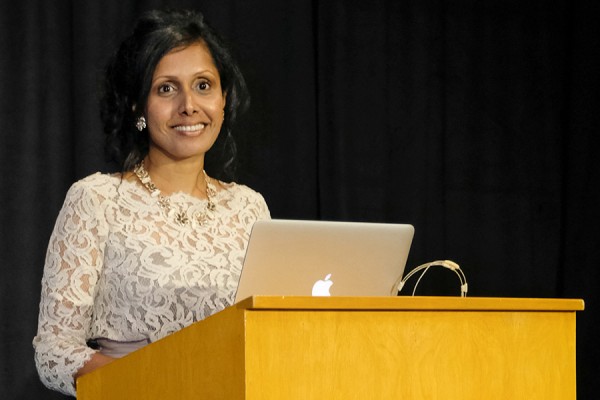 Charu Chandrasekera, founding executive director of the Canadian Centre for Alternatives to Animal Methods, speaks during its October 2 launch.
Charu Chandrasekera, founding executive director of the Canadian Centre for Alternatives to Animal Methods, speaks during its October 2 launch.
The University of Windsor's Canadian Centre for Alternatives to Animal Methods (CCAAM) and its subsidiary, Canadian Centre for the Validation of Alternative Methods (CaCVAM), a non-animal biomedical research and testing institute, officially launched on October 2, 2017, announcing three major initiatives - research, academic, and regulatory testing and policy - to establish human-centred health research and chemical safety testing as the gold standard.
“Testing medicine on animals, which is intended to treat humans, has a questionable record of effectiveness,” says Charu Chandrasekera, founding executive director of CCAAM. “We have a chance for UWindsor to be at the forefront of health research with human-specific disease modelling and chemical toxicity testing - this is the first centre of its kind in Canada and we are joining the global network as the Canadian hub.”
As part of the research initiative, CCAAM will partner with the United Kingdom based biotechnology company Kirkstall, to create “diabetes-in-a-dish,” a human cell and tissue-based experimental system to study and test drugs for Type 2 Diabetes. CCAAM will also partner with the Canadian company Aspect Biosystems Ltd to create human tissues with 3D printers.
“By championing human-based alternatives and reducing our reliance on animal methods, CCAAM will provide the health science community with the tools it needs to better understand and more effectively treat disease,” says Michael Siu, University of Windsor’s Vice President for Research and Innovation.
The academic component will see CCAAM establish unique academic courses and programs in animal replacement science, which will educate the next generation of scientists, ethicists, and policy makers.
“These up-and-coming scientists, health professionals, and decision makers will not only advance our understanding of the science, their research will profoundly improve the quality of life for all,” says Chris Houser, Dean of the Faculty of Science.
Dr. Chandrasekera says a close relationship with Canada’s primary federal regulator, Health Canada, will help move forward regulatory testing and policy initiatives that will modernize Canadian chemical safety testing standards. Health Canada representative Tim Singer says CCAAM is a definite advantage to Canada and he is looking forward to pursuing many opportunities for collaboration.
“As regulatory science moves to rely more and more on non-animal alternatives, it is important that we now have a focal point at the University of Windsor that will serve as a centre of expertise, a key collaborative partner, and the training ground for the next generation of highly qualified personnel who will contribute to Canadian regulatory science,” says Singer, director general, Environmental and Radiation Health Sciences Directorate, Health Canada, Government of Canada.
A strategic visioning workshop on October 3 brought together representatives of academic, industry, government, and non-profit sectors to consider:
- using homo sapiens as the quintessential model in disease research;
- replacing animals in undergraduate and high school education;
- assessing drug and chemical safety using human-based methods; and
- topics pertaining to the sentience, protection, and legal status of animals used for experimentation in Canada.
“By bringing together so many individuals and groups, who have a say in the science and ethics of animal experimentation, we can start to develop a strategic roadmap to advance Canadian animal replacement through human-based science, innovation, and ethics and contribute to global efforts in a uniquely Canadian way,” she says.
Results from the workshop will be used to develop the strategic roadmap for the Centre and will also be compiled into publishable consensus papers. The centre was first announced in June 2017 in the DailyNews.
